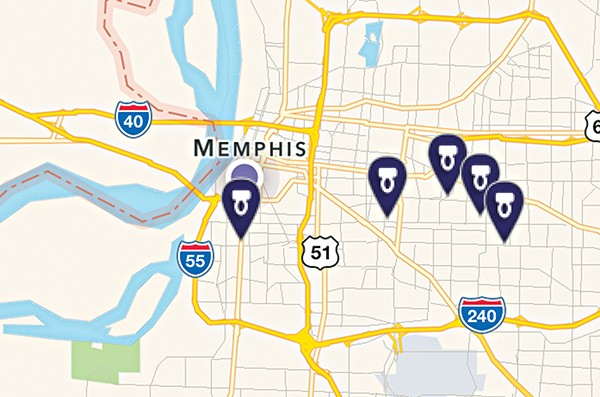As the U.S. battles over transgender rights, one smartphone app is making it easier for transgender people to access safe, public restrooms.
Refuge Restrooms — an app that indexes and maps inclusive bathrooms across the county for transgender, intersex, and gender-nonconforming individuals — has identified only six trans-friendly restrooms in Memphis. It lists two at the University of Memphis, one at Otherlands Coffee Shop, and three at Starbucks.
Refuge’s initial 45,000 nationwide entries were borrowed from a now-defunct database named Safe2Pee. When the Safe2Pee app became inoperative, California resident Teagan Widmer founded the Refuge app out of personal necessity.

bathrooms.
“I started publicly identifying as transgender [in 2010] while I was in graduate school in Richmond, Virginia,” Widmer, 27, said. “I found myself scared for my safety a lot and didn’t have the confidence I have now.”
In North Carolina, Refuge users have dropped pins at about 400 secure restrooms since Governor Pat McCrory signed House Bill 2 — nicknamed the “bathroom bill” — into law. The new law requires transgender people to use public restrooms that correspond with their sex at birth. A similar bill failed to pass last month in Tennessee.
The bathroom debate has sparked a national conversation about trans rights, and last week, it led President Barack Obama to issue a directive that public schools across the country should adopt trans-friendly bathroom policies or risk losing federal education funding. Governor Bill Haslam has expressed disagreement with Obama’s directive.
Anti-trans legislation, such as the North Carolina bill, passes when there’s pervasive misinformation, says assistant University of Memphis journalism professor Robert Byrd, who researches gender in the media.
“For decades, the only transgender representations people have been exposed to are the images on television and film, which were generally of sick or deviant people with a propensity for crime and violence or just the butt of a joke,” Byrd says. “It’s easy for some to believe the argument that transgender people in bathrooms that correspond to their expressed gender poses a threat to children because the narrative we see in popular culture supports that notion. This lack of knowledge helps fuel the fire of the bathroom bills.”
Lisa Michaels Hancock, a transgender woman living in Memphis, says public restrooms should be gender-neutral.
“I am a 6-foot-3 amazon that looks butch,” Hancock said. “On more than one occasion, I have been told I’m in the wrong restroom. My reply is ‘I have a vagina,’ which shouldn’t matter, but it usually shuts them up. I tell my girlfriends in advance that I won’t carry on conversations in restrooms because some women get thrown off by my voice, which isn’t very feminine.”
The problems Tennessee transgender people face extend beyond the bathroom. A court-ordered name change and letter certifying reassignment surgery must be presented with an application to change name or gender on any Tennessee identification. Tennessee also prohibits changing an individual’s sex on their birth certificate.
Since one in five transgender people experience homelessness, according to the National Healthcare for the Homeless Council, Widmer says she would like to eventually see Refuge serve as a housing resource for the transgender community.
Her app meets the needs of people who Widmer didn’t consider, too, which she was pleased to learn.
“One woman wrote me and explained that her adult son has severe Downs syndrome, and she uses Refuge to find gender-neutral restrooms that are single stall where she can accompany her son to assist him,” Widmer said. “It’s really easy to get caught up in the fight of it all, but ultimately for me, it’s about the people who are being affected. My only goal is to make their lives easier, and I think Refuge does that.”